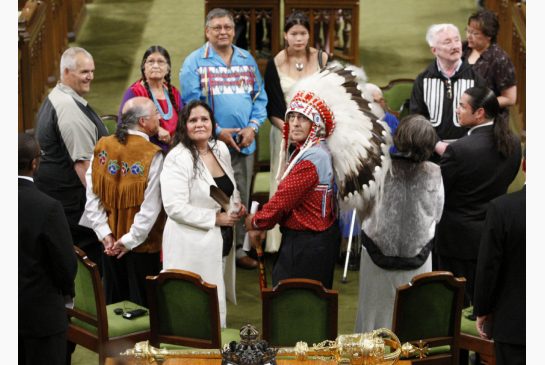Getting to the Truth of Reconciliation and Healing
Toronto Star
The British novelist and crusader against social injustice, George Orwell, once remarked that “telling the truth is a revolutionary act.” That’s being proven in northern Canada where schools in the Northwest Territories and Nunavut have begun teaching youth the true lessons of Canada’s residential schools history and the legacies that flow from it. In the process, they are not only confronting uncomfortable truths about the past; they are laying the foundation for a radically different future. It has taken nearly a century for mainstream Canadian society to acknowledge the misguided historic policies of assimilation, which were designed to stamp out aboriginal cultures, heritage and languages. The resulting physical, psychological and cultural damage was inflicted on vulnerable aboriginal children and families, separated from each other and forced to attend residential schools. It’s a legacy that has haunted successive generations, is a source of national shame and at the root of widespread personal, family and community dysfunction that lingers today. Once viewed as an instrument of oppression of aboriginal people, education is now beginning to be seen as a powerful tool to promote honesty, rectify wrongs and inspire a new generation to believe in a future of hope and possibilities. An innovative high-school social studies program recently launched by the two territories is helping families and communities to come to terms with the past and heal old wounds, enabling today’s youth to move forward to healthier, more positive and productive lives. “Residential Schools in Canada: Understanding the Past, Seeking Reconciliation, Building Hope for the Future” is the first comprehensive teaching unit of its kind in Canada. The governments of Nunavut and the N.W.T. partnered with the Legacy of Hope Foundation to produce the groundbreaking resource. The course, which is taught in Grade 10, follows an arc that begins by highlighting life before residential schools, then moves through the dark period, when aboriginal children all over Canada were taken to residential schools. It then shifts forward to a future in which aboriginal people reclaim their independence and strength. The unit explores traditional teaching and learning, colonialism, assimilation, the history and legacy of residential schools, the Indian Residential Schools Settlement Agreement, the federal apology and the Truth and Reconciliation Commission. It concludes with a look at what reconciliation between aboriginal and non-aboriginal peoples in Canada might look like in the future. It includes literature written for young adults, archive video and audio clips, and stories of former residential school students shared through audio and video interviews. The program is based on exhaustive research and the first-hand accounts of northern leaders alive today who attended residential schools. These leaders want their children and grandchildren to be proud of family members who were resilient in the face of the assimilative policies and now contribute to their communities in meaningful ways. They also want them to remember those who didn’t return home and to understand that this is a complex and often tragic story of children who were most vulnerable and should have been safe. It’s also a story where happiness was found in unexpected places. Most inspiring, residential school survivors are clear that they do not want another generation to carry the heavy burden of the past into their own futures. Instead, they want today’s youth, and all Canadians, to work together so we can move forward and make Canada a better country. This is a lesson that all Canadians need to know. As Commissioner Marie Wilson of the Truth and Reconciliation Commission has observed, “residential schools are not about aboriginal history; this is Canadian history based on Canadian laws that aboriginal people had no say in.” You wouldn’t know it from most text books in schools across the country, which still generally neglect or gloss over this tragic period in our country’s past. Not enough children, their parents or even this country’s leaders know what happened to aboriginal schoolchildren in Canada, not just a century ago but as recently as the 1990s. As Prime Minister Stephen Harper said on June 11, 2008, “The burden of this experience has been on your shoulders for far too long. The burden is properly ours as a government, and as a country. There is no place in Canada for the attitudes that inspired the Indian Residential Schools system to ever prevail again. You have been working on recovering from this experience for a long time and in a very real sense, we are now joining you on this journey.” We are hopeful that those south of 60 will follow our lead, exploring these challenging issues with resources like those that have been produced in the North. This will be part of the process that will allow all Canadians to finally close this dark chapter in Canada’s history. Telling the truth is essential if today’s aboriginal youth are to see education and schools as empowering, not places to be feared and resented. Most important, exposing the truth is the only way to build understanding and respect between aboriginal and non-aboriginal people — the key to achieving real reconciliation.
|
.
Any original material on these pages is copyright © BishopAccountability.org 2004. Reproduce freely with attribution.
